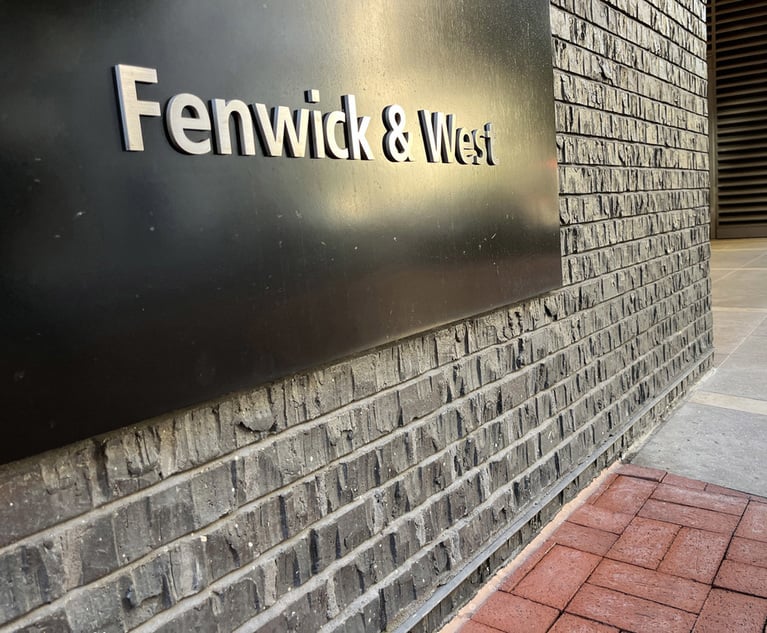New Yale Report Highlights Top 10 Law Firms for Women, Families
An annual report by Yale Law School has identified the best firms for working women and families.
April 20, 2018 at 03:18 PM
4 minute read

In the 13th iteration of its family-friendly Top 10 list, Yale Law Women has expanded its scope to recognize those firms trying to make inroads to close the gender gap in Big Law.
“Breaking out the two lists is an effort to recognize that gender equity and family friendliness are not the exact same thing,” said Megan Mumford, a first-year law student at Yale and co-chair of its survey committee.
After feedback last year from alumni that an exclusively family-friendly report focused on issues such as child care helped perpetuate gender stereotypes, Mumford said that Yale decided to create two separate lists with accompanying data.
“The Top 10 Female and Family Friendly Firms Lists of 2018” released by Yale Law Women, an organization dedicated to the advancement of women at the school and within the legal profession, surveyed around 50 firms in Big Law and examined their policies related to family leave and gender equality. The responses were then weighted against surveys of both men and women alumni from Yale currently working at those firms.
Topping the newly created “female-friendly firms,” listed in alphabetical order, are: Arnold & Porter Kaye Scholer; Bryan Cave (now known as Bryan Cave Leighton Paisner); Hogan Lovells; Holland & Knight; Katten Muchin Rosenman; Littler Mendelson; McDermott Will & Emery; Morgan, Lewis & Bockius; Morrison & Foerster; and Orrick, Herrington & Sutcliffe.
Many of those firms also topped the family-friendly list, which includes: Bryan Cave; Fish & Richardson; Hunton & Williams (now called Hunton Andrews Kurth); McDermott; Morgan Lewis; Orrick; Pillsbury Winthrop Shaw Pittman; Reed Smith; Vinson & Elkins; and Wilmer Cutler Pickering Hale and Dorr.
To calculate the gender equity among the firms, the Yale Law Women report looked at gender equity among a firm's hiring levels and the representation of women in leadership and promotions, as well as a firm's commitment to equitable training and mentorship.
Among the nearly 50 firms surveyed, 46 percent of associates were women, 21 percent of equity partners were women and 36 percent of lawyers promoted to equity partner last year were women.
Only three firms out of 50 had at least 25 percent women equity partners: Littler Mendelson, Ropes & Gray and Wilmer. Hunton & Williams, Morrison & Foerster, Perkins Coie, Reed Smith and Squire Patton Boggs were the only firms surveyed that have an executive committee composed of at least 35 percent female representation.
In addition to looking at a firm's policies, the Yale Law Women report also looked at the gender breakdown of policy usage.
“For example, with paid leave, if only women are taking [it] then that's not necessarily a sign of gender equity, even though you have the family-friendly policy,” Mumford said.
Only 32 percent of male lawyers in the firms' surveyed took some amount of caregiver leave. Firms with the highest percentage of men taking child care leave include Cadwalader, Wickersham & Taft; Mintz, Levin, Cohn, Ferris, Glovsky and Popeo; and Morgan Lewis.
The data and report from Yale Law Women is just the latest to cast a spotlight on gender equity within the legal profession, although some legal market observers have expressed skepticism about the value of various surveys and rankings designed to measure success.
Another survey released this week by Acritas Research Ltd. found that the mean average pay for male equity partners was 27 percent higher than that of female equity partners. The report by the market research consultancy also found that women were less likely to be selected as lead partners on matters, a startling trend that directly affects female compensation, often due to an emphasis on origination credits.
This content has been archived. It is available through our partners, LexisNexis® and Bloomberg Law.
To view this content, please continue to their sites.
Not a Lexis Subscriber?
Subscribe Now
Not a Bloomberg Law Subscriber?
Subscribe Now
NOT FOR REPRINT
© 2025 ALM Global, LLC, All Rights Reserved. Request academic re-use from www.copyright.com. All other uses, submit a request to [email protected]. For more information visit Asset & Logo Licensing.
You Might Like
View All

Sullivan & Cromwell Signals 5-Day RTO Expectation as Law Firms Remain Split on Optimal Attendance

Eversheds Sutherland Adds Hunton Andrews Energy Lawyer With Cross-Border Experience
3 minute readTrending Stories
- 1Meta Pulls Plug on DEI Programs
- 2On the Move and After Hours: Meyner and Landis; Cooper Levenson; Ogletree Deakins; Saiber
- 3State Budget Proposal Includes More Money for Courts—for Now
- 4$5 Million Settlement Reached With Stone Academy
- 5$15K Family Vacation Turned 'Colossal Nightmare': Lawsuit Filed Against Vail Ski Resorts
Who Got The Work
Michael G. Bongiorno, Andrew Scott Dulberg and Elizabeth E. Driscoll from Wilmer Cutler Pickering Hale and Dorr have stepped in to represent Symbotic Inc., an A.I.-enabled technology platform that focuses on increasing supply chain efficiency, and other defendants in a pending shareholder derivative lawsuit. The case, filed Oct. 2 in Massachusetts District Court by the Brown Law Firm on behalf of Stephen Austen, accuses certain officers and directors of misleading investors in regard to Symbotic's potential for margin growth by failing to disclose that the company was not equipped to timely deploy its systems or manage expenses through project delays. The case, assigned to U.S. District Judge Nathaniel M. Gorton, is 1:24-cv-12522, Austen v. Cohen et al.
Who Got The Work
Edmund Polubinski and Marie Killmond of Davis Polk & Wardwell have entered appearances for data platform software development company MongoDB and other defendants in a pending shareholder derivative lawsuit. The action, filed Oct. 7 in New York Southern District Court by the Brown Law Firm, accuses the company's directors and/or officers of falsely expressing confidence in the company’s restructuring of its sales incentive plan and downplaying the severity of decreases in its upfront commitments. The case is 1:24-cv-07594, Roy v. Ittycheria et al.
Who Got The Work
Amy O. Bruchs and Kurt F. Ellison of Michael Best & Friedrich have entered appearances for Epic Systems Corp. in a pending employment discrimination lawsuit. The suit was filed Sept. 7 in Wisconsin Western District Court by Levine Eisberner LLC and Siri & Glimstad on behalf of a project manager who claims that he was wrongfully terminated after applying for a religious exemption to the defendant's COVID-19 vaccine mandate. The case, assigned to U.S. Magistrate Judge Anita Marie Boor, is 3:24-cv-00630, Secker, Nathan v. Epic Systems Corporation.
Who Got The Work
David X. Sullivan, Thomas J. Finn and Gregory A. Hall from McCarter & English have entered appearances for Sunrun Installation Services in a pending civil rights lawsuit. The complaint was filed Sept. 4 in Connecticut District Court by attorney Robert M. Berke on behalf of former employee George Edward Steins, who was arrested and charged with employing an unregistered home improvement salesperson. The complaint alleges that had Sunrun informed the Connecticut Department of Consumer Protection that the plaintiff's employment had ended in 2017 and that he no longer held Sunrun's home improvement contractor license, he would not have been hit with charges, which were dismissed in May 2024. The case, assigned to U.S. District Judge Jeffrey A. Meyer, is 3:24-cv-01423, Steins v. Sunrun, Inc. et al.
Who Got The Work
Greenberg Traurig shareholder Joshua L. Raskin has entered an appearance for boohoo.com UK Ltd. in a pending patent infringement lawsuit. The suit, filed Sept. 3 in Texas Eastern District Court by Rozier Hardt McDonough on behalf of Alto Dynamics, asserts five patents related to an online shopping platform. The case, assigned to U.S. District Judge Rodney Gilstrap, is 2:24-cv-00719, Alto Dynamics, LLC v. boohoo.com UK Limited.
Featured Firms
Law Offices of Gary Martin Hays & Associates, P.C.
(470) 294-1674
Law Offices of Mark E. Salomone
(857) 444-6468
Smith & Hassler
(713) 739-1250











